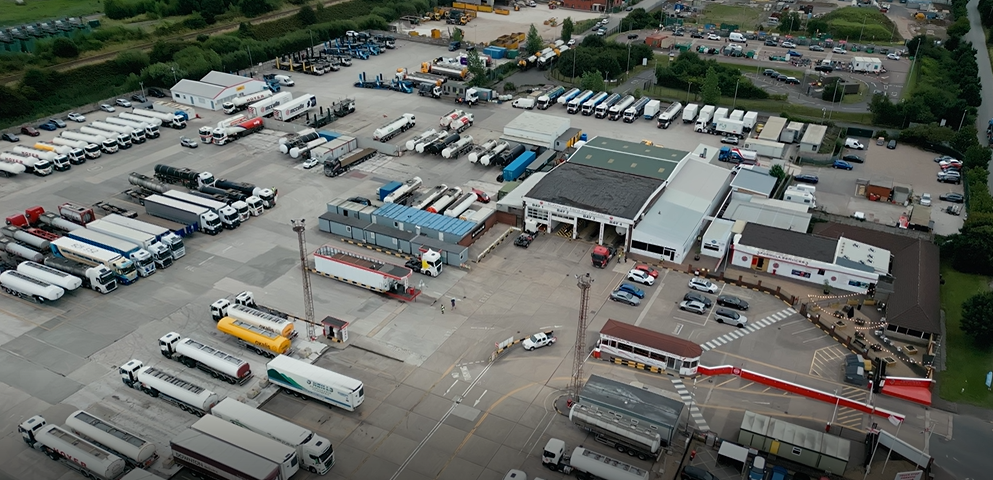
Josh Cousens
De rol van wagenparkbeheer in de vrachtwagensector: Waarom het belangrijk is
Gemaakt: 26-02-2025
•
Bijgewerkt: 26-02-2025
In de snel veranderende wereld van mobiliteit en wegtransport is effectief [vlootbeheer] (https://snapacc.com/fleet-operators/) essentieel om vrachtwagens in beweging te houden, kosten te verlagen en efficiëntie te verbeteren.
Of u nu een klein wagenpark beheert of een groot vrachtwagenbedrijf, de juiste software voor wagenparkbeheer kan de manier veranderen waarop bedrijven hun voertuigen, chauffeurs en operationele kosten beheren.
Efficiënt werken
Wagenparkbeheer is van cruciaal belang om ervoor te zorgen dat vrachtwagens op tijd en kosteneffectief aankomen waar ze moeten zijn.
Truck fleet management minimaliseert vertragingen en vermindert onnodige uitgaven door de prestaties van voertuigen, het brandstofverbruik en de activiteiten van chauffeurs te volgen.
Zonder een gestructureerde aanpak riskeren vloten prestatieproblemen die kunnen leiden tot hogere operationele kosten en een lagere winstgevendheid.
Hoe kan vlootbeheer de veiligheid en naleving van bestuurders verbeteren?
Wagenparkbeheerders maken zich grote zorgen over het welzijn van chauffeurs. Maar een goed beheerde vloot zorgt voor correct onderhouden voertuigen, optimaliseert routes om vermoeidheid te verminderen en houdt zich aan de regelgeving.
Software voor wagenparkbeheer helpt bedrijven om het gedrag van chauffeurs te controleren, het veiligheidsbeleid te handhaven en het risico op ongevallen of boetes voor niet-naleving te verkleinen.
Hoe kan wagenparkbeheer de operationele kosten voor transportbedrijven verlagen?
Enkele van de belangrijkste kosten in de transportsector zijn brandstofkosten, voertuigonderhoud en stilstandtijd.
Door oplossingen voor het beheer van vrachtwagenparken te implementeren, kunnen bestuurders het brandstofverbruik bijhouden, effectieve routes plannen en ervoor zorgen dat voertuigen op het juiste moment worden onderhouden, zodat dure storingen en ongeplande reparaties worden voorkomen.
Met de juiste gegevens kunnen wagenparkbeheerders weloverwogen beslissingen nemen die onnodige kosten terugdringen en de winstgevendheid verbeteren.

Hoe kunnen vlootbeheersystemen duurzaamheid in de truckindustrie ondersteunen?
Duurzaamheid krijgt steeds meer prioriteit in de hele transportsector. Systemen voor vlootbeheer stellen transportbedrijven in staat om emissies bij te houden, brandstofefficiëntie te controleren en milieuvriendelijke rijpraktijken te introduceren die de impact op het milieu verminderen.
Vloten kunnen datagestuurde oplossingen gebruiken om strategische aanpassingen te maken die aansluiten bij de regelgeving in de sector en de duurzaamheidsdoelstellingen van het bedrijf.
Wat zijn de grootste uitdagingen bij het opschalen van een vrachtwagenpark?
Het opschalen van een vrachtwagenpark brengt uitdagingen met zich mee, zoals het beheren van de toegenomen logistieke complexiteit en het behouden van de productiviteit. Hier zijn enkele uitdagingen die vloten kunnen tegenkomen bij het opschalen van hun vloot.
- Naarmate vloten groeien, worden geavanceerde planning, routeoptimalisatie en onderhoudsplanning essentieel om vertragingen en stilstand te voorkomen.
- Bovendien wordt het moeilijker om te zorgen voor consistente veiligheidsnormen en -voorschriften naarmate de vloot groter wordt, waardoor het risico op problemen en boetes toeneemt.
- Schaalvergroting vereist ook aanzienlijke investeringen in infrastructuur, zoals het aannemen en trainen van meer chauffeurs en het upgraden van software voor vlootbeheer.
Hoe SNAP vlootbeheer ondersteunt
Bij SNAP begrijpen we de uitdagingen waarmee wagenparkbeheerders worden geconfronteerd. Ons netwerk van digitale oplossingen voor de mobiliteitsindustrie helpt bedrijven hun activiteiten te stroomlijnen en de veiligheid en het gemak van bestuurders te verbeteren.
We bieden toegang tot een groeiend netwerk van parkeer- en waslocaties in heel Europa, waardoor vloten minder ongeplande stops hoeven te maken, de routeproductiviteit wordt verbeterd en vrachtwagens zonder oponthoud kunnen blijven rijden.
Naarmate de technologie voor vlootbeheer zich ontwikkelt, zetten wij ons in om innovatieve oplossingen te bieden die de veranderende behoeften van de sector ondersteunen.
Software voor vlootbeheer en gegevensgestuurde inzichten helpen transportmanagers hun activiteiten te stroomlijnen, uitgaven te beperken en ervoor te zorgen dat hun vloot optimaal functioneert.
Slotgedachten
Wagenparkbeheer is meer dan het volgen van voertuigen. Het gaat om het nemen van strategische beslissingen om de efficiëntie te verbeteren, risico's te verminderen en bedrijfsgroei op lange termijn te ondersteunen.
Met de juiste aanpak voor truck fleet management kunnen bestuurders de uitdagingen in de sector overwinnen en ervoor zorgen dat hun vloot soepel draait.
Op zoek naar meer innovatieve oplossingen voor wagenparkbeheer? Ontdek hoe de diensten van SNAP uw activiteiten kunnen optimaliseren. Ontdek onze oplossingen vandaag nog.



